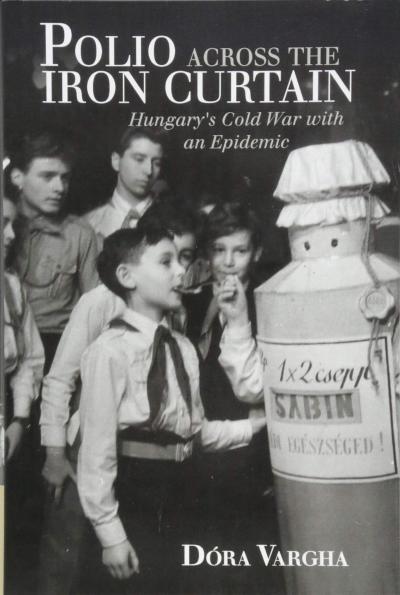
Dóra Vargha uses a series of polio epidemics in communist Hungary to understand the response to a global public health emergency in the midst of the Cold War.

Dóra Vargha uses a series of polio epidemics in communist Hungary to understand the response to a global public health emergency in the midst of the Cold War.
 Dora Vargha is a Senior Lecturer in Medical Humanities at the University of Exeter. She is the author of Polio Across the Iron Curtain: Hungary's Cold War with an Epidemic.
Dora Vargha is a Senior Lecturer in Medical Humanities at the University of Exeter. She is the author of Polio Across the Iron Curtain: Hungary's Cold War with an Epidemic.
In this podcast episode, we discuss the history of vaccines and public health with Dora Vargha, author of Polio Across the Iron Curtain: Hungary's Cold War with an Epidemic.
By the end of the 1950s, Hungary became an unlikely leader in what we now call global health. Only three years after Soviet tanks crushed the revolution of 1956, Hungary became one of the first countries to introduce the Sabin vaccine into its national vaccination programme. This immunization campaign was built on years of scientific collaboration between East and West, in which scientists, specimens, vaccines and iron lungs crossed over the Iron Curtain. Dóra Vargha uses a series of polio epidemics in communist Hungary to understand the response to a global public health emergency in the midst of the Cold War. She argues that despite the antagonistic international atmosphere of the 1950s, spaces of transnational corporation between blocs emerged to tackle a common health crisis. At the same time, she shows that epidemic concepts and policies were influenced by the very Cold War rhetoric that medical and political cooperation transcended. This title is also available as Open Access.
Dora Vargha was a 2010 to 2011 Dissertation Research Fellow and 2015 to 2016 Research Fellow at the Consortium for History of Science, Technology and Medicine.
Polio Across the Iron Curtain: Hungary's Cold War with an Epidemic (Cambridge: Cambridge University Press, 2018) is available as Open Access here.
Closed-captioning available on Youtube.
The Consortium’s collections provide many opportunities to learn more about the history of polio.
Our cross-institutional search tool allows researchers to investigate materials across multiple institutions from a single interface. With more than 4.4 million catalog records of rare books and manuscripts, the Consortium’s search hub offers scholars and the public the ability to identify and locate relevant materials.
Poliomyelitis Records, American Philosophical Society
Simon Flexner Papers, American Philosophical Society
Thomas M. Rivers Papers, American Philosophical Society
Visiting Nurse Association of Ambler & Vicinity Records, Bates Center for the Study of the History of Nursing
David Baltimore Oral History, California Institute of Technology
Renato Dulbecco Collection, California Institute of Technology
History of Vaccines, College of Physicians of Philadelphia
Toomey j. gazette / by, for, and about Respiratory Polios, Hagley Museum and Library
Jonas Salk Correspondence, Huntington Library
Library of Social and Economic Aspects of Medicine of Michael M. Davis, 1920-1966, New York Academy of Medicine
Medical Society of the County of New York Records, 1806-1989, New York Academy of Medicine
Albert B. Sabin Papers, Rockefeller Archive Center
Purnell W. Choppin papers, Rockefeller University Faculty, Accession 1992:039, Rockefeller Archive Center
Bert Hansen collection of medicine and public health in popular graphic art, 1850-2010, Yale University
© 2026 Consortium for History of Science, Technology and Medicine | Copyright Infringement